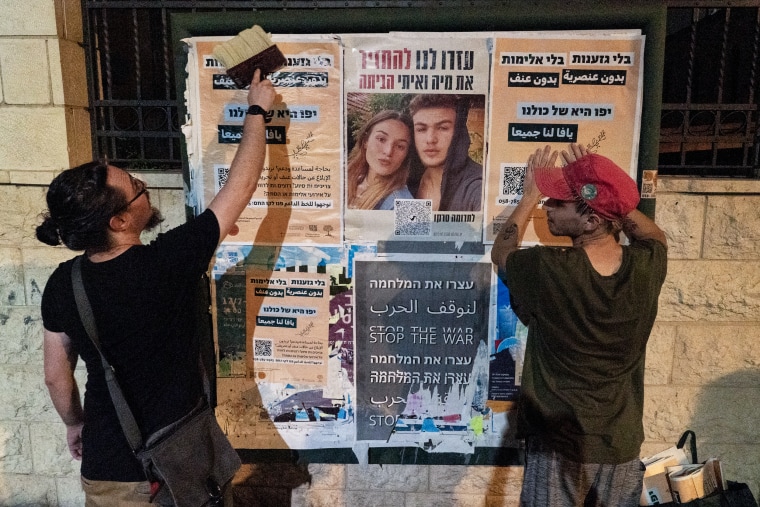JAFFA, Israel — Up a narrow, stone stairwell in this ancient port city, a group of self-confessed radicals plot an evening of interfaith rebellion.
In a sea of hardening views and violent rhetoric after the Oct. 7 Hamas attack, this small but growing band have formed an unofficial civil guard, an attempt to prevent the type of urban unrest that has accompanied previous rounds of conflict between Israel and militants in Gaza.
Their mostly leftist movement is a fringe one, a relative speck of cooperation in a land where ethnic and territorial strife is once again reaching a crescendo.
But on a recent humid night, their task was mixing: Israeli Arabs and Jews — and wallpaper paste.
“We are trying to send a message — not just to the local community but to the whole world — that there are people who want to come together and reject the violence that we are seeing,” said Amir Badran, who is Arab, a local councilman with the “We Are the City” party, and one of the group’s leaders. “I lie awake at night worried that a ground offensive could spark more unrest in the streets here as we have seen before.”
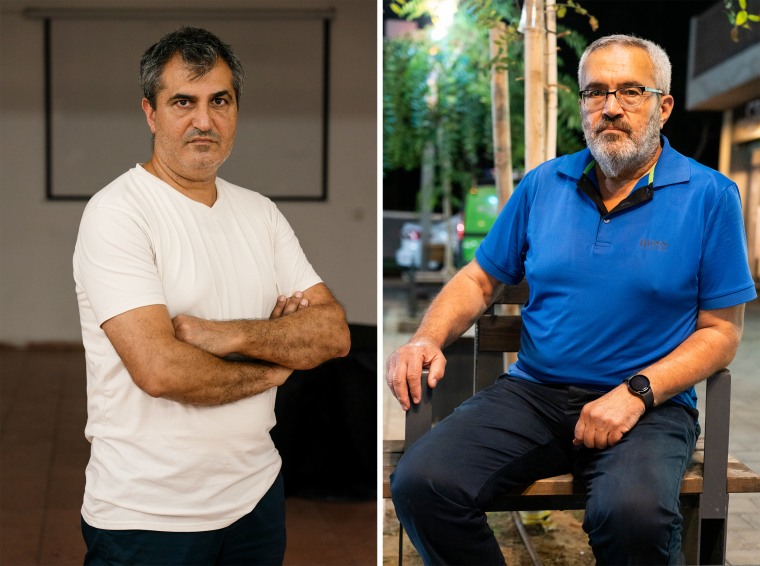
So, perched on a dimly lit rooftop terrace above a hummus cafe, he joined two dozen of the group’s core members to make wallpaper paste, the buckets of sticky slop primed to plaster posters of their cause across the neighborhood. They are in Hebrew and Arabic, and feature a QR code inviting people to join the movement.
They know their voice represents a tiny minority.
But the extent of its nascent support has also surprised them, with its WhatsApp groups attracting 3,000 members, 100 of whom have received some form of “training” from others in the group with different expertise.
They have taken on a range of tasks: accompanying both Arab and Jewish Israelis who are scared to journey across other neighborhoods; sending supplies to Israeli communities displaced by the recent conflict; and, in the event of significant unrest , planning to dispatch volunteers to document and even mediate.
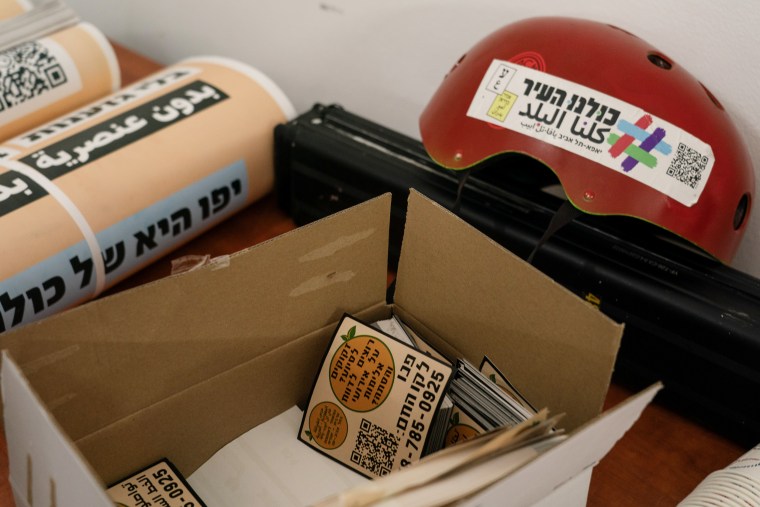
All here are visibly harrowed by the events of May 2021, when violence in Jerusalem and rocket fire exchanged with Gaza caused Jaffa and elsewhere to descend into rioting, looting and arson.
This is one of Israel’s “mixed cities,” where 37% of the population is Arab. Everyone in the group says the locals mostly get along, and the violence two years ago was the doing of far-right and extremist elements from other districts.
That strife showed that the “relationships between Arabs and Jews here were very fragile,” said Omar Siksik, an Arab community leader who used to run the area’s Arab-Hebrew Theater.
Though distressing, this led to “real dialogue and real friendship between Arabs and Jews,” said Siksik, a well-known figure who locals say is highly respected on both sides of the divide. It was the “first time we felt a very warm closeness, because each side expressed their own fears to the other one” and “we became very good friends, hosting each other” in our homes.
These were the seeds of the civil guard that was set up two weeks ago, part of an overarching goal of swimming against the suspicion, prejudice and hate swelling in the region.
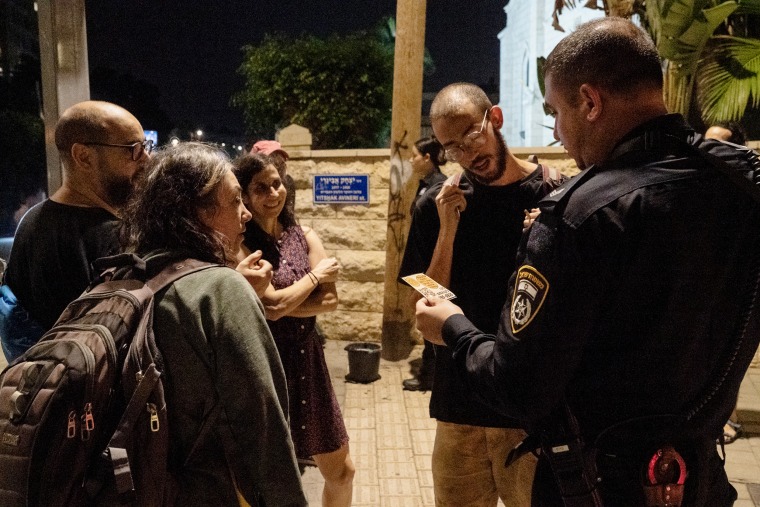
Mirroring the demographics of Tel Aviv-Jaffa, most here are Jewish. However, unlike the wider Israeli population, where populism rules and the government is the most right-wing in the country’s history, they range from center-left to avowedly communist.
Most see themselves as allies who need to protect their at-risk Arab neighbors. But few here kid themselves that their worldview is anywhere near making a breakthrough into the Israeli mainstream, where public opinion only seems to have hardened since the Oct. 7 attacks.
Meital Pinto, 46, a law professor specializing in the protection of the Arabic language, said she considers the nighttime poster campaign so controversial among friends and family that she hasn’t even told her husband she is here.
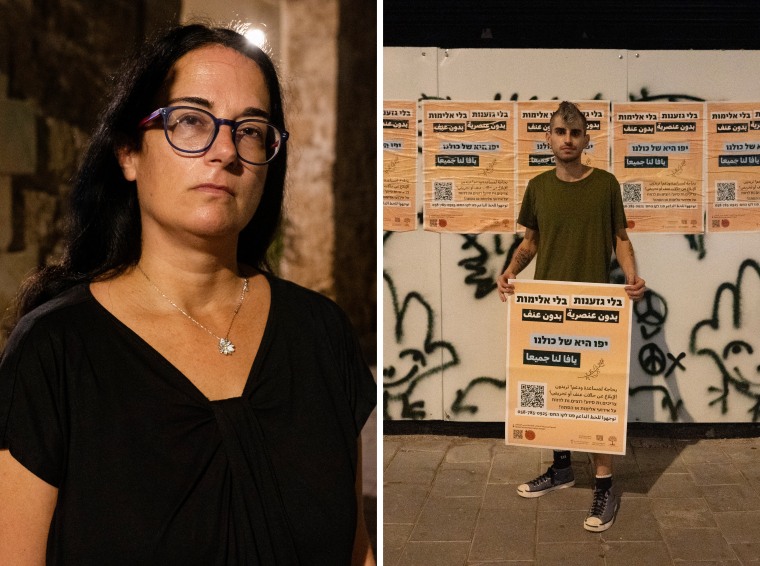
“People say to me, ‘You have to be realistic, you’re dreaming of peace, and you’re dreaming of collaboration between Arabs and Jews, but you’re not realistic,’” she said while slapping a sticker on a lamppost. “People just lost faith.”
The night’s ringleader is Yeheli Cialic, 23, a Jewish Israeli who grew up in a “mainstream family” but now describes himself as a communist and an “anti-Zionist.” He says helping Arabs negotiate the institutionalized prejudice they face in Israel is the civil guard’s priority.
This feeling of anti-Arab discrimination has only grown under the successive governments of Prime Minister Benjamin Netanyahu. And since the attacks, advocacy groups say Israeli authorities have eroded free speech by treating many expressions of Palestinian solidarity as incitement.
But it’s also there for Jewish people who have legitimate fears about cross-community tensions.
“Everyone is afraid, but not everyone is equally threatened,” he says, wielding a bag of rolled-up posters and unable to shake hands, elbow-bumping instead, because he is covered in paste.
The crew is mostly young. Among them is Amit Okin, 23, who ran away from his yeshiva and his increasingly religious family to become a self-described anarchist with safety pins in his ears and a half-shaved head.
“I didn’t understand it, I didn’t understand why we can’t love everybody,” he says, unnecessarily apologizing for his almost-perfect English. “We are always told that they hate us, so we need to hate them. I always felt something was wrong there.”
